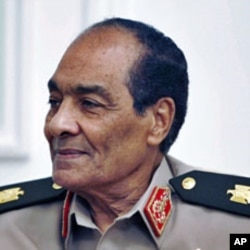Egyptian protesters plan to return to the streets Friday for what they're billing as a "Second Revolution." The activists fear the long-term change and lasting reform they've been seeking is being sidetracked.
Using the tools of their January 25 uprising, Egyptian youth are calling on Facebook and Twitter for a massive turnout in Cairo's Tahrir Square and elsewhere across the country after noon prayers Friday.
Motivation
Ahmed Salah, a long time activist and organizer of the earlier revolt, says the current leadership of the Supreme Military Council, which took power after President Hosni Mubarak left office, has not made a clean break with the past.
"There has been a lot of regression in the current path of the revolution due to constant attempts to diffuse it or sabotage it by probably people in the military council, the staff, or others from, of course, the central state security and from the former NDP and those still in power," Salah said. "And we are just trying to get things back to their original path."
Frustration has been simmering for weeks, and boiled over during a "National Dialogue Conference" Monday. Youth activists walked out of the government-called meeting, furious over the participation of what they said was too many members of the old elite, including officials from the former ruling National Democratic Party.
Social media warning
The military council, turning to social media as well, says it welcomes the free expression of ideas, but is against Friday's demonstrations. It warns that elements from abroad will use thugs, posing as patriots, to infiltrate the rallies.
Their alleged aim is to provoke confrontations to split the people and the army, which the council calls the linchpin of the nation's safety and security.
While the reference to elements abroad usually means Israel and the United States - the latter still unpopular for its closeness to the Mubarak government - some Egyptians are also believed to be among those being accused.
Loyalties
Former police colonel turned activist Omar Afifi, in exile in the U.S, says he has no animosity toward defacto Egyptian leader Field Marshall Mohamed Tantawi, but is concerned about his loyalties.
The policeman notes that Tantawi spent 20 years as defense minister in the old government and profited handsomely. The revolution, he argues, is against the Field Marchall's personal interests.
Afifi, who gained popularity among activists with his book on evading police brutality "So You Don't Want to Get Beaten on the Back of the Neck" was one of the early organizers of the January 25 revolt. He sees in the months since then what he believes is a time-honored manipulation of the public.
He says leaders are putting pressure on people in terms of difficulty in making a living, shortages in diesel fuel and lax security leading to increased crime. The old government, he argues, is still in session.
Moving forward
Activist Saleh outlines the steps he thinks are needed to move forward.
"We would like to have a civilian presidential council to replace the Supreme Armed Forces and to have a new constitution to ensure the rights of everyone, to ensure the free and fair elections when the time comes, to make sure that they're going to be just trials for everyone that had been involved, the corruption and to bring back all out looted assets," said Salah.
The military council has already overseen a referendum on changes to the constitution, and is planning for parliamentary elections in the coming months. Most political observers believe the military has no interest in the responsibility of running of the country and would be content to return to its powerful behind-the-scenes role.
But activists, most of whom rejected the constitutional changes wanting a completely new document instead, fear the council would be happy if the old guard still had a prominent role. Even the military's concessions to popular demands are viewed with suspicion.
This week's announcements that it will open the border to Gaza and that Mubarak and his sons will face trial are called "tranquilizers" by former Colonel Afifi.
Afifi says what is needed is medicine, a curing remedy for the nation's underlying problems. He says until the goals of the uprising are met, activists are ready to go back to Tahrir Square a hundred times over.





